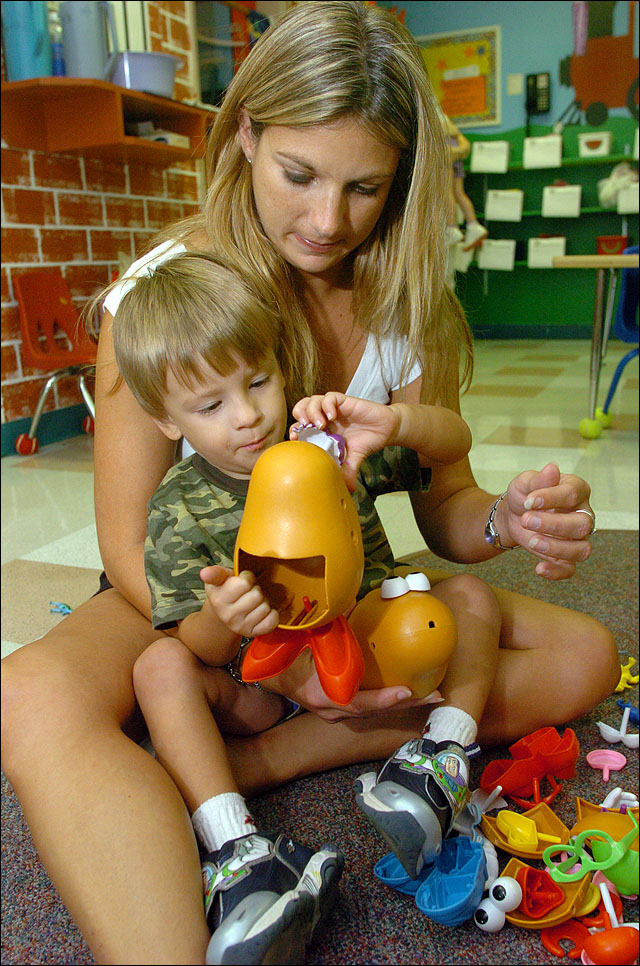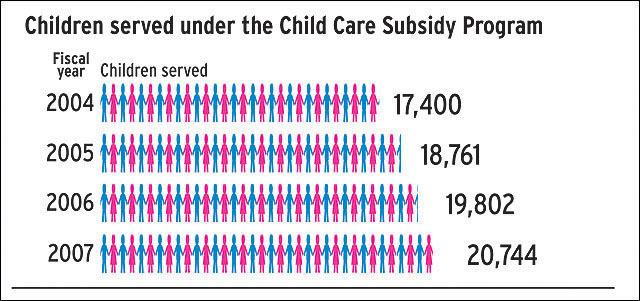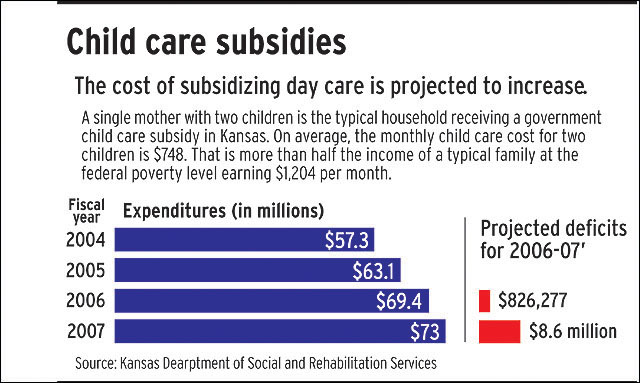Possible cuts in child care worry parents
Welfare officials may reduce subsidies
Topeka ? Tracee Nelson, a single mother of three who works full-time as a nurse, doesn’t even want to think about what would happen if the state pulled her child-care assistance.
“I make just enough to get by, but not enough to succeed, without this sort of assistance,” said Nelson, whose daughter and two sons attend Children’s Learning Center, 205 N. Mich.
But that assistance may be reduced for Nelson and thousands of low-income working Kansas families who face child-care expenses that in many instances surpass housing costs.
State welfare officials Thursday proposed reducing child-care subsidies in the face of a projected deficit that could reach $8.6 million within a year.
News of the possible reductions were criticized by state and local child-care officials.

Shelly Jaskiewicz, lead teacher at the Children's Learning Center, 205 N. Mich., plays with Eli Cohavi, 3, on Thursday afternoon. State welfare officials have proposed reducing child-care subsidies.
“It’s going to hurt families,” said Anna Jenny, executive director of the Douglas County Child Development Assn.
“They want them to work, but how do you work without child care?” Jenny said.
Federal funding flat
During the past fiscal year, the state allocated $63 million in child-care subsidies to help provide care for 18,761 children younger than 13.
That cost is expected to climb to $69.4 million in the current fiscal year and $73 million in the next. Meanwhile, federal funding that pays for the subsidies have remained essentially flat, officials said.
“The prognosis for increased funding is poor, and there is a strong likelihood of decreased mandatory spending,” said Candy Shively, deputy secretary of the Kansas Department of Social and Rehabilitation Services.
To keep providing help to the growing numbers of children receiving assistance, SRS has proposed limiting the number of hours paid for child care, increasing family co-pay fees and reducing the eligibility limit from 185 percent of the federal poverty level to 170 percent.
Currently, a parent with two children earning $2,480 per month – 185 percent of the federal poverty level – would be eligible for child-care assistance after paying a $243 per month co-pay. The average cost of child care for an infant in Douglas County is $764 per month.

“All these options outlined by SRS are going to affect vulnerable families,” said Cindy D’ercole, with Kansas Action for Children.
Limited funds
Child-care advocates said they hoped the state would provide the extra funding needed to prevent the reductions, but state lawmakers appeared doubtful.
“Where do we get that funding?” said Rep. Willa DeCastro, R-Wichita. “There are lots of funding needs and only a certain amount of funding.”
Shively said the availability of quality child care was important to help children develop, while secondarily pumping dollars into child-care businesses and underwriting employers who pay low wages.

Nelson, the Lawrence mother, said she believed the state and federal governments should step in and increase assistance. Without the assistance program, Nelson said she would be paying nearly $1,900 per month in child care during summer months.
“I would not be able to work,” she said.
She and other child-care advocates predicted that cutting child-care subsidies in the long run would prove more costly to the state than maintaining the payments.
“Without child care, for many, the only alternative is not to work. Where would that leave the state?” Nelson asked.







